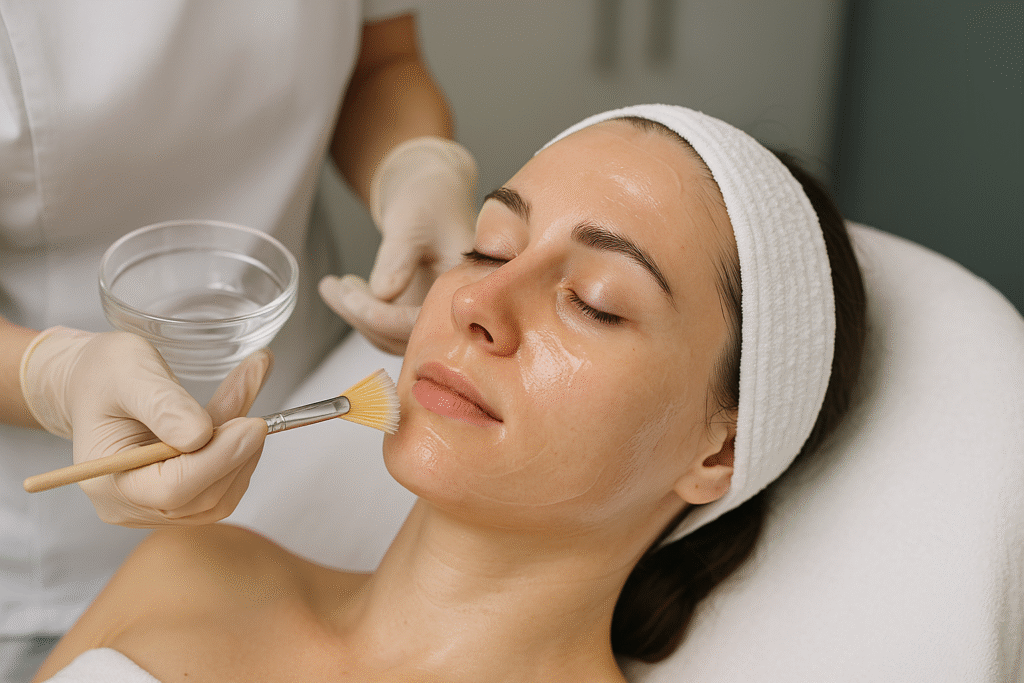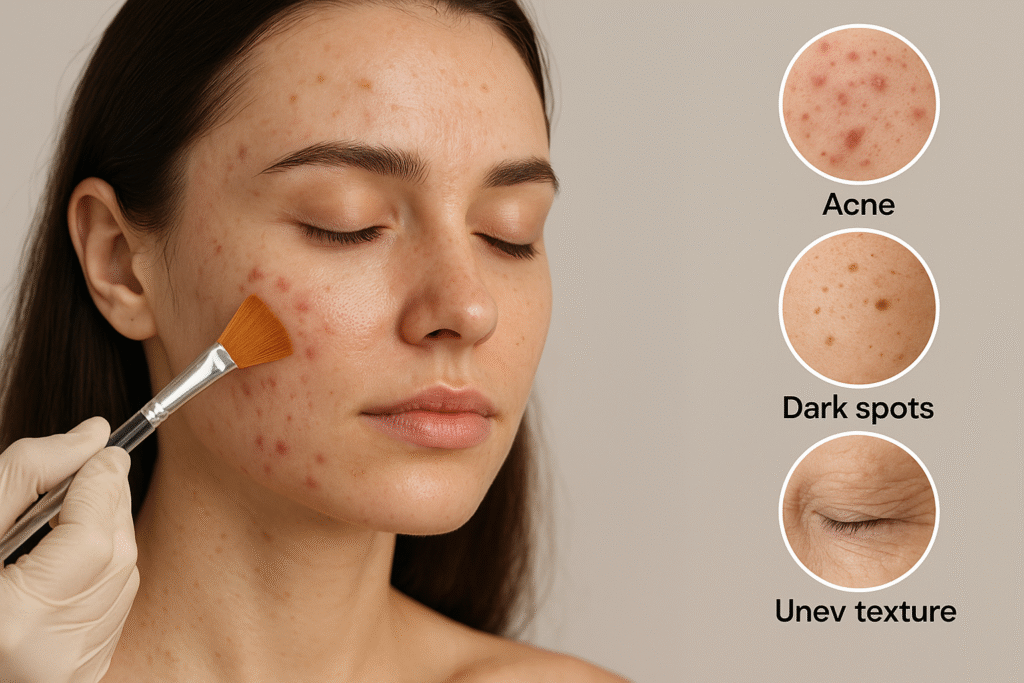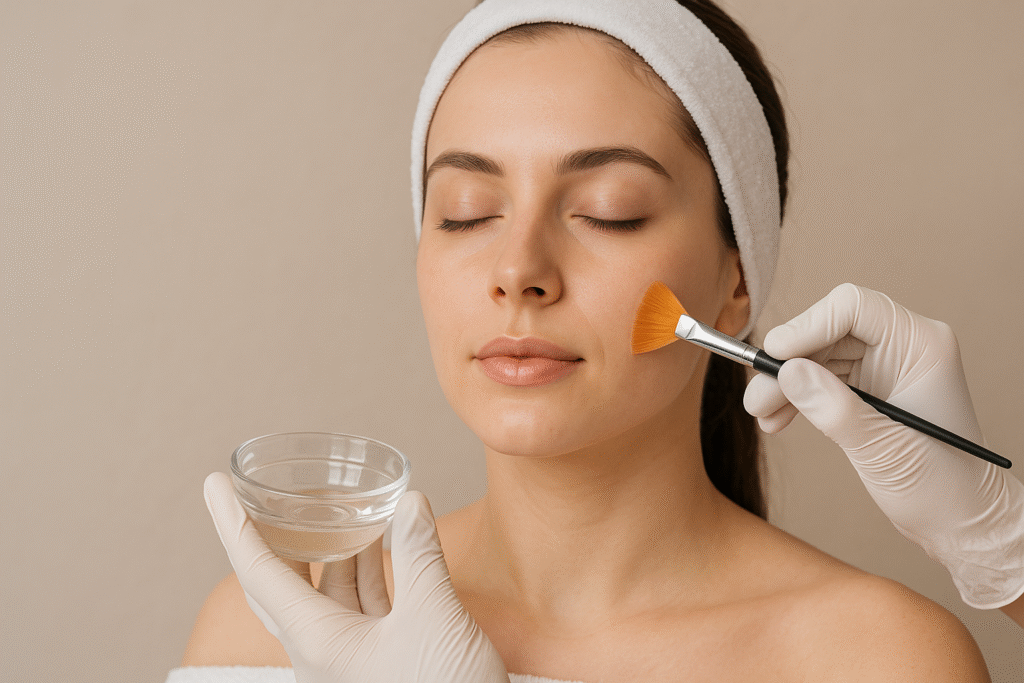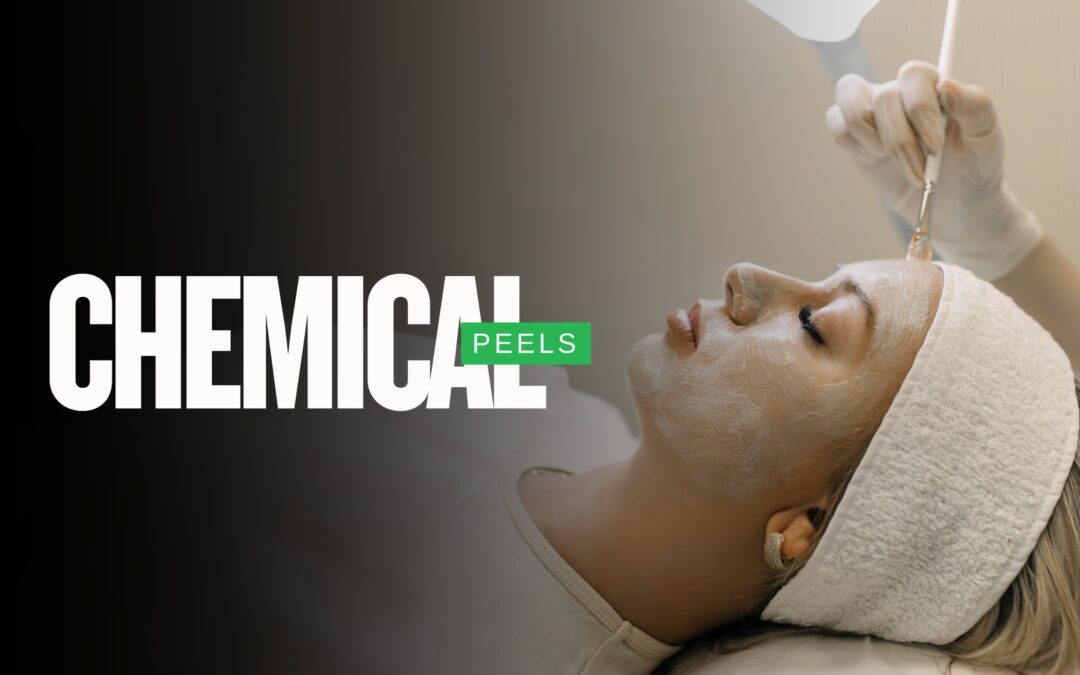Introduction
Chemical peels are today one of the most popular dermatological treatments available. Whether you are dealing with acne scars, pigmentation, dullness, or uneven texture, a chemical peel can provide you with a non-surgical way to enjoy clearer, smoother, younger-looking skin. Delhi has become a crowded city filled with environmental stress, including pollution and constant sun exposure, leading to an increased demand.
What Are Chemical Peels?
Chemical peels are resurfacing treatments that apply safe chemical solutions to gently remove the top layers of skin. When the outer layer is stripped away, it exposes fresh, healthier skin below. The treatment is known to enhance skin texture, tone, and radiance.

Types of Chemical Peels
Based on the skin concern and condition, a dermatologist may prescribe various chemical peels, including:
Superficial Peels (Light Exfoliation)
These are gentle peels ideal for mild skin dullness, uneven tone, or minor texture concerns. Often recommended as a monthly maintenance treatment.
Medium-Depth Peels (For Pigmentation and Scars)
These target deeper skin layers to address acne scars, hyperpigmentation, and sun damage effectively.
Deep Peels (For Deep Rejuvenation)
Used for advanced skin concerns like wrinkles and intense pigmentation. These require downtime but deliver dramatic results.
At Kotil Skin Science, every peel is carefully chosen and tailored to your skin type and objectives.
Why Opt for Chemical Peels in Delhi?
The climate and lifestyle of Delhi come with unique skin challenges:
- Year-round intense UV exposure
- High pollution levels
- Humidity and dust
- Stress and sleep deprivation
These environmental and lifestyle factors can lead to clogged pores, dullness, pigmentation, and signs of premature aging. Chemical peels offer a science-backed, non-invasive method to tackle these issues effectively.
Kotil Skin Science in Preet Vihar provides a wide range of customized chemical peels designed to suit Delhi’s environmental and skin conditions.

Common Skin Concerns Treated with Chemical Peels
Chemical peels are highly versatile and can treat multiple skin concerns:
Acne and Acne Scars
Salicylic acid or glycolic acid peels reduce active acne, prevent breakouts, and fade acne marks over time.
Pigmentation and Melasma
Sunspots, hormonal changes, or post-inflammatory pigmentation can be corrected through peels that target melanin clusters.
Dull and Rough Skin
Chemical peels remove dead skin cells caused by pollution and aging, revealing smoother and brighter skin.
Fine Lines and Wrinkles
By stimulating collagen production, peels help reduce the appearance of fine lines and improve skin elasticity.
The Procedure: What to Expect
At Kotil Skin Science, each treatment session begins with a thorough skin analysis. Based on your needs, the right concentration and type of peel is selected.
Step-by-Step Process:
- Deep cleansing of the skin
- Application of the chemical peel
- Monitoring skin’s reaction
- Neutralizing and removing the peel
- Applying a hydrating and soothing solution
Each session lasts around 30–45 minutes and involves minimal discomfort. Some patients may experience slight redness or flaking in the following days, which is part of the skin’s natural regeneration process.

Advantages of Receiving Chemical Peels from Kotil Skin Science
Choosing a trusted and experienced clinic ensures results and safety. Kotil Skin Science in Preet Vihar offers:
- Experienced dermatologists who understand Indian skin
- Use of FDA-approved, safe, and effective chemical formulations
- Customized treatment plans based on individual needs
- Hygienic, modern clinic environment
- Detailed aftercare and continuous support
Patients trust Kotil Skin Science for both the results and the personal care they receive throughout their treatment journey.
What Makes Chemical Peels So Effective?
The true strength of chemical peels lies in controlled exfoliation. As damaged outer layers shed, your skin heals and regenerates itself from within.
Peels also improve the effectiveness of your daily skincare products by helping them penetrate deeper, giving you better results over time.
Aftercare Instructions for Long-Lasting Benefits
To get the best and safest results, follow these aftercare steps:
- Avoid direct sunlight for at least a week
- Use a high-SPF, broad-spectrum sunscreen daily
- Don’t scratch or peel flaking skin manually
- Stick to gentle, hydrating skincare products
- Stay hydrated and get adequate sleep
Kotil Skin Science provides all patients with a post-treatment care plan to help their skin heal and glow optimally.
How Frequently Should You Have Chemical Peels?
The frequency depends on your skin goals and condition. Some may need monthly treatments for maintenance, while others might benefit from a series spaced 2–4 weeks apart.
Regular sessions can help maintain clear, smooth, even-toned skin year-round.
Final Thoughts
Chemical peels offer more than a surface-level change — they deeply transform your skin and restore your confidence. If you’re in Delhi and looking for a trusted, professional place to start your skin journey, Kotil Skin Science is a reliable choice.
With its science-driven treatments, customized care, and expert staff, the clinic ensures you enjoy long-term skin health and radiance — without surgery or harsh downtime.
FAQs: Chemical Peels in Delhi
Q1. Are chemical peels painful?
Most patients experience only mild tingling or warmth. The sensation is temporary and well-tolerated.
Q2. Can chemical peels treat acne scars?
Yes. Repeated medium-depth peels can significantly reduce the visibility of acne scars.
Q3. Is there downtime after a chemical peel?
Mild redness or flaking may occur for a few days, but most people resume normal activities right away.
Q4. Are chemical peels safe for Indian skin?
Absolutely. When performed by trained professionals like those at Kotil Skin Science, peels are safe and effective for all Indian skin types.
Q5. How do I choose the right peel for my skin?
Your dermatologist will evaluate your skin and recommend the most appropriate peel based on your unique concerns and sensitivity level.

